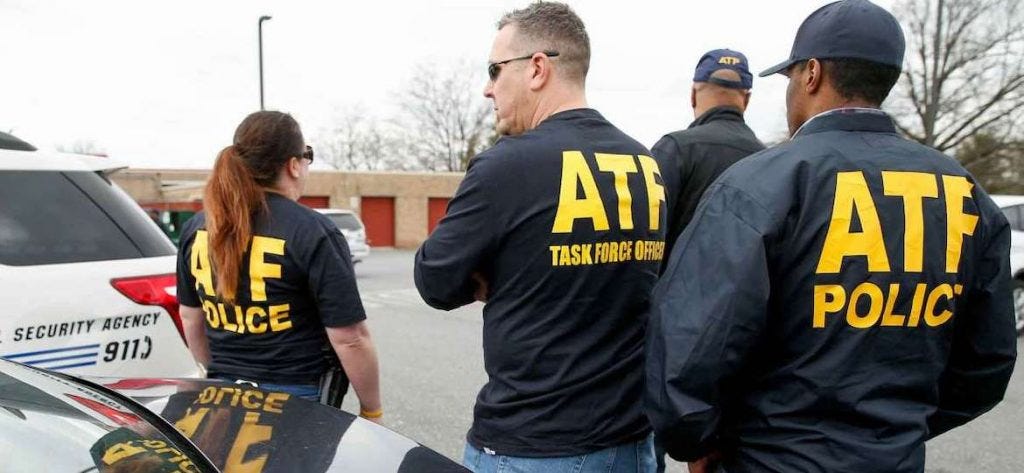10 Things the ATF Doesn’t Want You to Know
Blunders and little-known facts ATF would prefer you keep quiet.
View original story on The Gun Writter Substack.
by Lee Williams
The Citizens Committee for the Right to Keep and Bear Arms recently called on Congress to block funding for the Bureau of Alcohol, Tobacco, Firearms and Explosives until “Democrats and federal bureaucrats publicly recognize Second Amendment rights of law-abiding citizens, and stop their attacks on legal gun ownership.”
If they lose all or part of the $1.9 billion Joe Biden wants to give them in his FY2024 budget proposal, the ATF only has itself to blame. The agency writes its own laws and then overzealously enforces them — a fact that has finally caught the attention of a few courts. The ATF is out of control and seemingly immune from the normal checks and balances other federal law enforcement agencies face.
While many of its foibles are well known, especially those that resulted in the deaths of innocent Americans, here are a few blunders and little-known facts the ATF would prefer you keep quiet.
Non-serialized firearms
The ATF does not distinguish between homemade firearms, which do not legally require a serial number, and factory-made firearms that have had their serial numbers illegally altered, defaced or removed by criminals. The ATF considers all firearms without a legible serial number to be “ghost guns.” The ATF has been manipulating the statistics on “ghost guns” since the term was invented. It should be noted that building homemade firearms is perfectly legal in most free states.
Administrative charges
The majority of ATF’s criminal charges are filed administratively after another law enforcement agency has made an arrest. When police arrest an armed criminal with a previous felony conviction — a prohibited person — they may ask ATF to pursue federal charges, which usually carry a stiffer penalty than state charges. Of course, the ATF takes credit for the investigation and subsequent prosecution, once again manipulating the stats, by claiming it was part of its Project Safe Neighborhoods (PSN) program.
Firearm industry does not trust ATF
Bumpstock manufacturers, the makers of certain aftermarket triggers and the genius behind the pistol brace, which was originally designed for disabled veterans, all have one thing in common: They all received determination letters from the ATF that said their accessories were fine and not subject to regulation by the National Firearms Act, which would have killed their business. Then, after succumbing to political pressure, the ATF changed its mind. Bumpstocks and certain drop-in triggers became machineguns, and more than 40 million pistol braces could become Short Barrel Rifles. While the agency’s newfound zeal to write and enforce its own laws will likely be resolved in court, it will be a lengthy and expensive process. Meanwhile, I know of at least one small trigger manufacturer who’s waiting for the next administration before sending anything to the ATF for review.
Leadership reviled by staff
Some of ATF’s rank-and-file agents are gun guys or gun gals. They joined the agency for a variety of reasons: to take bad guys off the street, to protect the public or to qualify for a federal pension. There are two ATFs they’ll tell you, the careerists who put in the time and do the work, and the politically appointed leadership. Every single agent I’ve ever met eventually tees off on their leadership. The agents blame political appointees for the agency’s long list of deadly mistakes, Waco, Ruby Ridge, Fast and Furious — all of which resulted in the loss of civilian lives.
Secret gun registry
ATF has been caught red-handed at least twice creating an illegal gun registry, which is a violation of federal law. First, we learned agents were digitizing thousands of Form 4473s, which we shipped to the agency by gun dealers who retired, quit or went out of business. Then, an Arizona gun dealer caught an ATF inspector photographing his paperwork with her cell phone. To date, no one has been disciplined for these clear violations of federal law.
Selective memory
The ATF’s website has no mention of Ruby Ridge, Randy Weaver or the 11-day standoff that killed Weaver’s wife, son and Deputy U.S. Marshal William Degan. Nor is there anything on the website about slain Border Patrol Agent Brian Terry, who was murdered by a gun the ATF let walk into Mexico as part of its “Fast and Furious” debacle. The ATF devotes only one page to the deadly siege at Waco, although it is still attempting to deflect blame for the more than 70 deaths.
“A subsequent investigation by the Departments of Treasury and Justice regarding the actions of law enforcement agents during the siege determined that some tactics and decisions were poorly executed; and certain actions by ATF were criticized. However, the September 1993 U.S. Department of Treasury Administrative Review concluded: ‘... the agency is made up of dedicated, committed and experienced professionals, who have regularly demonstrated sound judgment and remarkable courage in enforcing the law,’” ATF’s website states.
Recruiting mentally disabled informants
In 2013, a Milwaukee newspaper revealed that the ATF had set up storefront stings, and that agents specifically recruited mentally disabled people as informants. At first, the use of these informants was attributed to “rogue agents” operating solely in Milwaukee, but the newspaper revealed the tactic of recruiting “low IQ” informants was commonplace and also used in Pensacola, Albuquerque and Wichita.
FFL revocations for clerical errors
Revocations of Federal Firearm Licenses have increased more than 500% since Joe Biden declared war on America’s guns. Many of the revocations involve nothing more than clerical errors — errors that would have been resolved with a pencil eraser before Biden took office. Nowadays, ATF’s new zero-tolerance policy allows for no excuses. Any error is considered a willful violation of ATF rules, which results in revocation.
Ignores FOIA requests
The ATF has a habit of complying with Freedom of Information Act requests, or FOIA requests, only if their response won’t prove too controversial, while ignoring FOIAs if the response would prove embarrassing to the agency. Whether the ATF likes it or not, the Freedom of Information Act is federal law. That a federal law enforcement agency knowingly violates federal law is unconscionable.
Bonuses for bosses
Two years ago, an ATF whistleblower told the public that ATF was awarding 25% bonuses to administrators who did not qualify for the bump in pay. The Law Enforcement Availability Pay, or LEAP bonuses, were meant for “criminal investigators” only – those working irregular shifts or on-call at all hours. LEAP bonuses were not meant for administrators. A subsequent investigation by the Office of Personnel Management found ATF paid at least 94 employees inappropriately and concluded ATF “engaged in prohibited personnel practices.”
The Second Amendment Foundation’s Investigative Journalism Project wouldn’t be possible without you. Click here to make a tax-deductible donation to support pro-gun stories like this.




